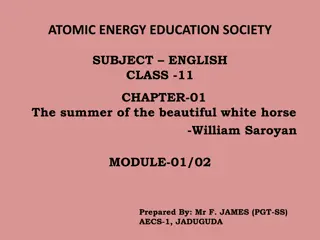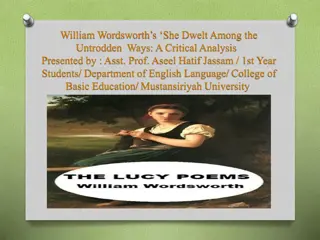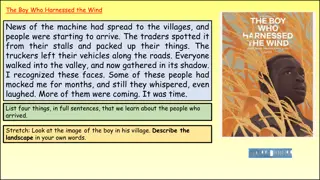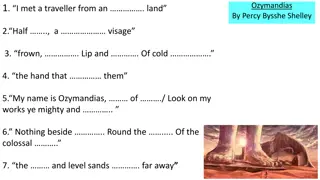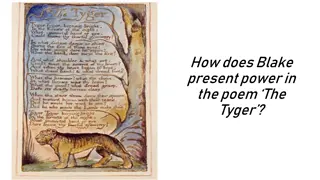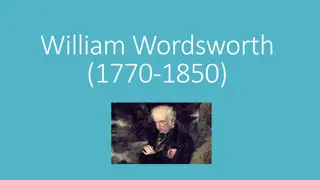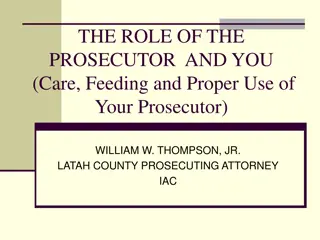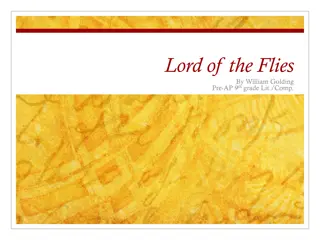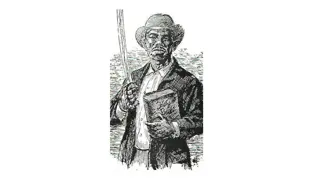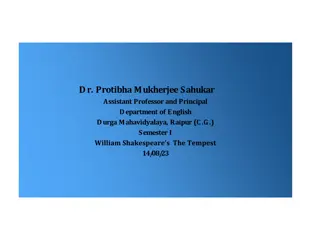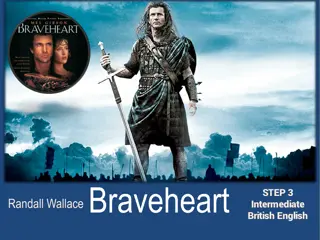Analysis of Sonnet 65 by William Shakespeare
Sonnet 65 by William Shakespeare explores the theme of Time as a powerful force that defies all earthly materials. The poet contemplates how beauty, no matter how strong, will ultimately succumb to Time's relentless passage. The sonnet delves into the idea of immortality through poetry, suggesting t
0 views • 6 slides
Uranus
Explore the intriguing details about Uranus, ranging from its unique pronunciation debates to being the first planet discovered by William Herschel in 1781. Despite its faint visibility in the night sky, Uranus has a rich history of observation and mystery. Learn about its significance in astronomy
1 views • 25 slides
Survival and Struggle: William Strachey's Account of The Tempest
William Strachey, a member of the Virginia Company, recounts the harrowing shipwreck of the Sea Venture on the Bermuda island in a storm. Despite mutiny attempts, survivors endured almost a year before reaching safety. Explore the challenges they faced and the possible influence on Shakespeare's pla
0 views • 10 slides
The Summer of the Beautiful White Horse - William Saroyan: Chapter 1 Summary
Two poor Armenian boys, close friends and cousins, encounter a beautiful white horse that fulfills their dream of riding. However, suspicions arise about the horse's origins, leading to questions about honesty and family reputation in this engaging narrative by William Saroyan.
4 views • 9 slides
Poets Through Time: A Glimpse into Literary Legends
Explore the lives and works of renowned poets such as William Shakespeare, William Blake, Robbie Burns, Edgar Allan Poe, Emily Dickinson, Robert Frost, and T. S. Eliot. From Shakespeare's timeless plays to Blake's mystical artistry and Poe's haunting tales, delve into the diverse realms of poetry an
0 views • 11 slides
Overcoming Fear of Water: The Story of William Orville Douglas
William Orville Douglas, a renowned American jurist and politician, shares his childhood experience of nearly drowning and overcoming his fear of water in this excerpt from his autobiography. Despite his initial apprehension, with determination and some help, he conquered his fear and learned to swi
0 views • 16 slides
Analysis of William Wordsworth's "She Dwelt Among the Untrodden Ways
William Wordsworth's poem "She Dwelt Among the Untrodden Ways" from the Lucy series explores themes of loneliness, beauty, and death through simple language and elegiac tone. The poem juxtaposes the beauty of nature with the mysterious and distant character of Lucy, symbolizing unrequited love and l
0 views • 8 slides
Exploring 'Summer of the Beautiful White Horse' by William Saroyan
Discover the tale of Aram and Mourad, two boys from a poor Armenian tribe, in William Saroyan's 'Summer of the Beautiful White Horse.' The story unfolds as suspicions arise when Mourad appears with an unexpected treasure, leading to a moral dilemma and a journey of self-discovery for the young cousi
0 views • 10 slides
The Boy Who Harnessed the Wind: A Story of Innovation and Perseverance
In rural Malawi, a young boy named William Kamkwamba builds a windmill out of scraps to save his village from drought and famine. Despite facing skepticism and challenges, William's determination leads to success, educational opportunities, and hope for his community's future.
0 views • 7 slides
Selection of Poems by Shelley, Blake, Browning, Wordsworth, Tennyson, Owen, and Heaney
A diverse collection of poems by renowned poets such as Percy Bysshe Shelley, William Blake, Robert Browning, William Wordsworth, Alfred Lord Tennyson, Wilfred Owen, and Seamus Heaney. Each poem delves into different themes and emotions, showcasing the beauty and power of poetry through vivid imager
1 views • 15 slides
Reflecting on William Martin School Memories
It's that time of year when memories at William Martin School are shared and reflected upon. Students are encouraged to write and film their favorite memories to create a heartfelt leavers service. Mind maps and writing prompts help students organize their thoughts by year group, leading to a collec
0 views • 6 slides
Analyzing Power in William Blake's Poem "The Tyger
Explores how William Blake presents power through the depiction of the fierce and beautiful tiger in his poem "The Tyger." The analysis delves into the imagery, symbolism, and awe-inspiring nature of the tiger, emphasizing the concept of divine creation and the duality of existence.
1 views • 14 slides
William Wordsworth (1770-1850): Poet of Nature and Memory
William Wordsworth, a renowned English poet, was born in 1770 and his works were inspired by the landscapes of the Lake District. His collaboration with Coleridge in publishing "Lyrical Ballads" marked a significant moment in Romantic poetry. Wordsworth's emphasis on simplicity, nature, memory, and
0 views • 7 slides
Exploring "The Tyger" by William Blake: An Insight into the Poet's Vision
William Blake, a visionary poet and artist, crafted "The Tyger" as a thought-provoking piece questioning the nature of creation and the duality of existence. Through rhetorical questions and literary devices, Blake delves into the mystery of the fierce beast and reflects on themes of divine power an
0 views • 7 slides
The Influence of William Congreve on Restoration Comedy
William Congreve, an English playwright and poet of the Restoration period, is known for his clever and satirical dialogue that influenced the comedy of manners style. The Restoration period marked the end of Cromwell's Commonwealth and the return of monarchy with Charles II. Comedy of manners refle
0 views • 10 slides
Analysis of William Blake's Poem "The Tyger
The poem "The Tyger" by William Blake, published in his 1794 volume, Songs of Experience, contrasts with his earlier work, "The Lamb." It delves into the creation of the fearsome tiger, questioning the divine creator and the symbol of fire, strength, and danger conveyed by the tiger. The speaker won
0 views • 9 slides
Critical Appreciation of William Blake's Poem 'The School Boy' - Lesson 3
Learners will delve into the critical appreciation of William Blake's poem 'The School Boy' in Unit 5, Lesson 3. The lesson entails an elaborate discussion about the poem, offering essential information about the poet, and preparing students for examinations. The poem reflects on the contrast betwee
0 views • 15 slides
The Romantic Poet William Wordsworth: Life, Works, and Influence
William Wordsworth, a prominent Romantic poet, was known for his connection to nature, emphasis on individualism, and rejection of industrialization. This summary discusses his life, notable works like "Lyrical Ballads," and his impact on the Romantic Movement.
1 views • 18 slides
Understanding the Role of a Prosecutor: William W. Thompson, Jr. Latah County Prosecuting Attorney
In this informative text, the duties and responsibilities of a prosecuting attorney, exemplified by William W. Thompson, Jr. of Latah County, are discussed. The loyalty oath, statutes, and primary responsibilities associated with the role of a prosecutor are highlighted, emphasizing legal and proper
0 views • 75 slides
The Journey to Abolishing Slavery: Understanding William Wilberforce & the Movement
Discover the historical context of slavery, the pivotal role of William Wilberforce, and the reasons behind Britain's decision to abolish the slave trade in 1807. Explore key events, debates, and societal shifts that led to the abolition movement, shedding light on the complexities and motivations i
0 views • 9 slides
Analysis of "The School Boy" by William Blake
In William Blake's poem "The School Boy," a young boy expresses his unhappiness with school, longing for freedom and nature. He resents the joyless lessons and yearns for a life outdoors. The poem highlights the contrast between the boy's desire for joy and freedom with the confinement and sorrow of
0 views • 11 slides
The Remarkable Story of William Henry Lynch: Gallipoli Hero
Born in Wellington in 1895, William Henry Lynch enlisted in the army in 1914, embarking on a journey from New Zealand to Gallipoli, where he tragically lost his life in the Battle of Chunuk Bair in 1915. Despite dental issues, Lynch fought with valor as part of the Wellington Mounted Rifles, represe
0 views • 10 slides
William Wates Memorial Trust: Honoring Will's Legacy through Le Loop Cycling Event
The William Wates Memorial Trust organizes Le Loop, where amateur cyclists ride the Tour de France route for charity. Participants commit to fundraising targets and support disadvantaged youth. Will Wates' legacy lives on through this event, which aims to give back and help young people fulfill thei
0 views • 12 slides
Dreams Explored: Poetic Perspectives of William Wordsworth, D.H. Lawrence, and Langston Hughes
Delve into the world of dreams through the lens of renowned poets William Wordsworth, D.H. Lawrence, and Langston Hughes. Discover the poetic interpretations and societal impacts of dreams as envisioned by these literary figures, exploring themes of aspiration, social change, and cultural movements
0 views • 26 slides
An Analysis of "Lord of the Flies" by William Golding
William Golding's "Lord of the Flies" explores the darker aspects of human nature and society, using symbolism, irony, and literary techniques to depict the descent into savagery when stranded on a deserted island. The themes of good vs. evil, loss of innocence, and the innate nature of humanity are
1 views • 51 slides
Exploring Themes and Symbolism in William Golding's Lord of the Flies
William Golding's novel, Lord of the Flies, delves into the inherent struggle between good and evil, the loss of innocence, and the impact of societal constructs on human nature. Through symbolism, allusions, and literary techniques, Golding paints a vivid picture of a group of boys stranded on an i
0 views • 57 slides
Exploring the Depths of "Lord of the Flies" by William Golding
William Golding’s "Lord of the Flies" is a powerful allegorical novel that delves into human nature, society, and the struggle between civilization and savagery. Set in the aftermath of WWII, the story follows a group of boys stranded on an uninhabited island, each representing different facets of
0 views • 12 slides
Remembering Nat Turner: Perspectives from Historical Documents
Explore various perspectives on Nat Turner's legacy through historical documents such as "The Insurrection" by William Lloyd Garrison, "The Confessions of Nat Turner" by Thomas R. Gray, and analyses by scholars like John W. Cromwell and William S. Drewry. The documents shed light on Turner's role as
0 views • 16 slides
Analysis of William Blake's "The Chimney Sweeper" from Songs of Innocence
William Blake's "The Chimney Sweeper" from Songs of Innocence sheds light on the plight of children in a harsh society where young boys are forced into chimney sweeping. Blake criticizes child labor and injustice, portraying the innocence and exploitation of these young workers. The poem delves into
1 views • 7 slides
Analysis of William Shakespeare's "The Tempest" and Its Themes
The Tempest" by William Shakespeare is a tale of magic, betrayal, and revenge set on an enchanted island. The play follows the exiled Prospero as he seeks justice while exploring themes of power, forgiveness, and redemption. Through a cast of intriguing characters and intricate plots, Shakespeare de
2 views • 26 slides
Analysis of William Blake's Use of Noun Phrases in "London
Exploring William Blake's poem "London," this analysis focuses on the use of noun phrases to describe people, places, objects, and emotions. By examining the nouns chosen by Blake and the patterns they form, we gain insight into the vivid and evocative imagery he creates. The expanded noun phrases i
1 views • 4 slides
The Enigmatic Legacy of William Shakespeare: Multifaceted Genius and Cultural Icon
Explore the mysterious life and prolific works of William Shakespeare, a multifaceted genius known for his 38 plays, 154 sonnets, and timeless contributions to literature. Uncover the enigmatic persona behind the renowned playwright and actor, delving into his creative mastery, the Globe Theater, an
0 views • 52 slides
The Succession Crisis of 1066: An Overview
England in the 11th century faced a succession crisis in 1066 due to a lack of clear rules for the throne. Edward the Confessor's weak rule led to competing claims from Harold Godwinson, William of Normandy, Edgar Aetheling, and Harald Hardrada. The Battle of Hastings in 1066 saw Harold's defeat by
0 views • 4 slides
William Paterson University Middle States Accreditation Progress Report
The Middle States Accreditation process at William Paterson University is progressing smoothly, with activities including self-study drafting, community feedback, and campus labs utilization for assessment training. The timeline involves drafting three stages, culminating in submission to the MSCHE
0 views • 9 slides
Braveheart: The Beginning of a Young Hero's Journey
In the year 1276, a young Scottish boy named William Wallace witnesses a brutal massacre that changes his life forever. With his father and brother slain, William is left with a burning desire for revenge against the English. Guided by his uncle, William begins his journey towards becoming a legenda
0 views • 53 slides
A Journey Through Radiation Biology: Discoveries and Milestones
Explore the historical milestones in radiation biology, from the discovery of radiation by energetic particles to key figures like Herschel, Röntgen, Curie, and more. Learn about the impact of radiation on living organisms, genetic effects, and famous experiments that shaped our understanding of th
0 views • 14 slides
Herschel Grammar School - Excellence in Education and Wellbeing
Herschel Grammar School prioritizes excellent teaching, promoting resilience, and fostering a kind and respectful culture. With strong student feedback, enthusiastic staff, and ambitious leadership, the school provides rich experiences for the whole child. Impressive GCSE and A-Level results reflect
0 views • 16 slides
Factors Behind William's Victory at the Battle of Hastings
In 1066, William of Normandy triumphed at the Battle of Hastings due to a combination of his strengths, Harold's weaknesses, and other factors. This victory was attributed to various strategic decisions, military tactics, and William's determination to claim the English throne. The battle marked a s
0 views • 10 slides
William of Normandy and the Domesday Book: A Lesson in Governance
Explore the reign of William of Normandy and the significance of the Domesday Book in understanding his methods of control. Dive into the challenges faced by William's commissioners as they gather information on land ownership across England and analyze the patterns emerging from the collected data
0 views • 8 slides
Unveiling the Historicity of Christ: Ancient Sources and Scholarly Insights
Historian Will Durant and other ancient sources provide evidence of Jesus Christ as a real historical figure, supported by scholars like Thallus, Cornelius Tacitus, and Josephus. Contemporary views from scholars like Dr. Michael Grant and Clifford Herschel Moore reinforce the historical existence of
0 views • 44 slides



